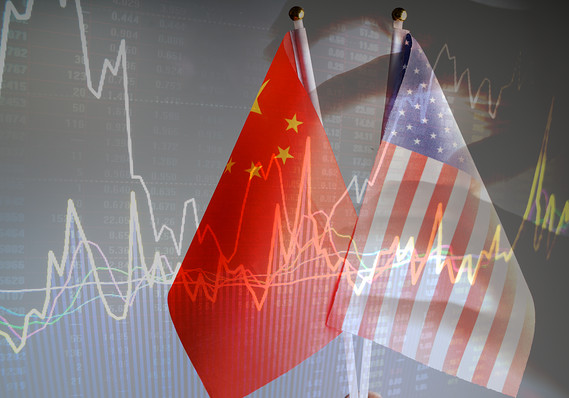Longest partial government shutdown enters 32nd day
U.S. stocks closed lower Tuesday, snapping a four-day winning streak, as trade woes and fresh concerns over the state of the global economy greeted investors returning from the long holiday weekend.
Earnings also remained in focus, with a busy week ahead.
How did the benchmarks fare?
The Dow Jones Industrial Average DJIA, -1.22% sank 301.87 points, or 1.2%, to 24,404.48, while the S&P 500 index SPX, -1.42% dropped 37.81 points, or 1.4%, to 2,632.90. The Nasdaq Composite Index COMP, -1.91% fell 136.87 points, or 1.9%, to 7,020.36.
What drove the market?
Stocks were battered by reports that U.S. officials turned down an offer by China to hold a preparatory meeting on trade negotiations due to a lack of progress in areas including “forced” technological transfers and economic reforms. However, the market trimmed its losses late in the session after White House adviser Larry Kudlow denied that the U.S. rejected China’s overtures.
Meanwhile, if the U.S. formally requests the extradition of Huawei’s chief financial officer, Meng Wanzhou, from Canada over allegations she lied about the company’s dealings with Iran, negotiations with China could become even more difficult.
On Monday, the International Monetary Fund cut its global growth forecast to 3.5% for 2019 from 3.7% in 2018 and from the 3.7% it predicted for 2019 back in October. Unveiling its forecasts at the World Economic Forum in Davos, Switzerland, the fund left its prediction for U.S. growth this year unchanged at 2.5%.
Investors are also digesting a fresh round of corporate earnings and paying close attention to management commentary on the global economic outlook. As of Friday, 11% of S&P 500 companies have reported, according to FactSet, with 56% announcing earnings beats, below the five-year average of 60%.
A partial government shutdown stretched into its 32nd day on Tuesday, and there was little sign of the deadlock breaking. Democrats rejected Trump’s latest proposal to temporarily extend protections for some young immigrants brought to the country illegally as children, in exchange for $5.7 billion for his border wall.
The shutdown has caused a backlog of economic data, with only a smattering of reports due this week, including jobless claims and Markit manufacturing and services purchasing managers index data.
Existing-home sales fell to a seasonally adjusted annual rate of 4.99 million in December, their lowest in three years, according to the National Association of Realtors.
Which stocks were in focus?
Arconic Inc. ARNC, -15.98% tumbled 16% after the maker of steel products for the car and aerospace industries said it is no longer pursuing a sale of the company.
Shares of Johnson & Johnson JNJ, -1.45% fell 1.5% even after the firm announced fourth-quarter results that surpassed analysts’ expectations for revenue and earnings.
Halliburton Co. HAL, -3.07% dropped 3.1% despite reporting fourth-quarter profit and revenue that beat Wall Street estimates.
Shares of Travelers Companies Inc. TRV, -1.33% were down 1.3% after the insurer announced it beat analysts’ estimates for both sales and earnings in the fourth quarter.
Bunge Ltd. BG, -2.15% shares retreated 2.2% after the agriculture and food-business company announced that its full-year earnings would fall short of its previous guidance.
Stanley Black & Decker Inc. SWK, -15.48% shares skidded 16% after the firm gave disappointing guidance for 2019.
Shares of eBay Inc. EBAY, +6.13% rallied 6.1% after Elliot Management, an activist hedge fund, issued a letter to eBay’s management laying out a five-step plan that Elliot said could lead to a valuation of $55 to $63 a share by the end of 2020.
What were analysts saying?
Investors are digesting a lot of negative news, Michael O’Rourke, chief market strategist at JonesTrading, told MarketWatch.
“Traders are looking at headlines saying that the U.S. and China aren’t making progress on intellectual property, that China is pushing ahead with its ‘Made in China 2025’ strategy,” and that global growth is continuing to slow, he said.
Meanwhile, “at Davos you have all these political and business leaders talking about all the headwinds we’re facing, so investors are thinking now it’s time to take a step back and see what happens next,” he said.
“Today’s selloff is a result of the big move we had on Thursday and Friday,” said Ed Keon, chief investment strategist at QMA.
“Markets are trying to find the right level. We were too low on Christmas Eve. We’ve had a substantial rebound, but it’s not like there aren’t things that can go wrong or are going wrong,” like a slowing Chinese economy, he said.
Keon said that on balance, corporate executives’ outlooks for the coming year haven’t been encouraging. “A number of executives are guiding lower,” he said, adding that analysts’ estimates for earnings growth for 2019 are also falling at a rapid rate of 1 percentage point per month.
“When analysts’ forecasts are dropping like this, when they’re falling at 1 [percentage point] per month, they tend to keep falling throughout the year.”
How did other markets trade?
Trade and growth worries weighed on Asian markets, with the Shanghai Composite Index SHCOMP, -0.03% sliding 1.4%. In Europe, stocks closed lower, with the Stoxx Europe 600 SXXP, -0.36% falling 0.4%.
Crude oil CLG9, -1.91% fell sharply, while gold GCG9, -0.03% settled mostly unchanged and the U.S. dollar DXY, +0.02% traded flat.

